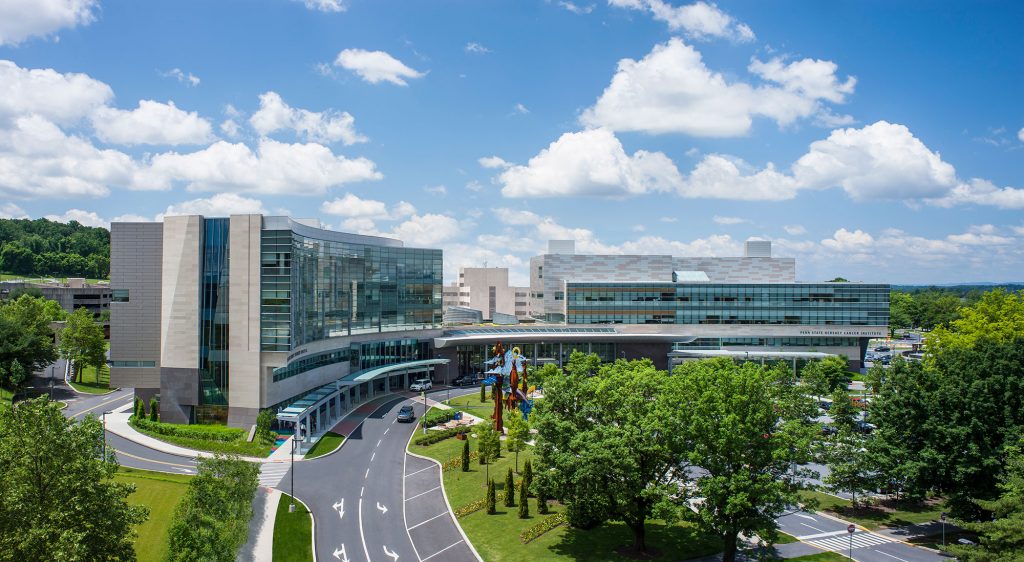Jump to topic
Search
Program Details
The Infectious Diseases Fellowship at Penn State Health Milton S. Hershey Medical Center strives to educate the next generation of infectious diseases leaders by providing an intellectually exciting, diverse and supportive environment in which trainees can develop the skills necessary to succeed in clinical care, education and research.
During their training, fellows will develop expertise in caring for patients with the following conditions in both the inpatient and outpatient settings:
- General infections including COVID-19 and other respiratory virus infections, skin and soft tissue infections, cardiac device infections, blood stream infections, infections related to complicated wounds, tick borne infections, travel-related infections, pneumonia, fever of unknown origin, CNS infections, postoperative infections, tuberculosis, and many other types of infections
- People living with HIV, seen in comprehensive care clinics funded primarily by Ryan White HRSA grants, providing services at six regional sites and following over 700 patients
- Infections related to solid organ transplant through a dedicated consult service
- Infections in patients with cancer or who have undergone a hematopoietic stem cell transplant through a dedicated consult service
- Complex bone and joint infections through a dedicated consult service
Fellows will also participate in health system and public health-oriented services including antimicrobial stewardship, hospital epidemiology and infection prevention, employee health, and special pathogens preparedness initiatives.
In addition to these clinical activities, fellows are involved in research and educational conferences that are aimed at providing a foundational knowledge of clinical research and critical literature review. Interested fellows will have the opportunity to enroll in Penn State College of Medicine programs to achieve a Graduate Certificate in Clinical Research or a Master of Public Health.
The program follows the Infectious Diseases Core Curriculum in the training of infectious diseases fellows, in preparation to sit for the ABIM Board Examination in infectious diseases. Flexibility exists in the curriculum to tailor clinical or research months to an individual fellow’s interests and career goals.
Learn More about the Fellowship
General Application Information
The Infectious Diseases Fellowship welcomes informal inquiries via email to Dr. Tonya Crook, Program Director, or by calling 717-531-8881.
The program accepts applications only through the ERAS System.
Interview Details
The program interviews on Thursdays from September through November. Interviews are being held virtually. Those selected to interview will be contacted directly to arrange an interview.
Virtual Tour
Penn State Health
Penn State Health is a multi-hospital health system serving patients and communities across 29 counties of Pennsylvania. Its mission is to improve health through patient care, research, education and community outreach.
In December 2017, the system partnered with Highmark Health to facilitate creation of a value-based, community care network in the region. The shared goal of Highmark and Penn State Health is to ensure patients in the community are within:
- 10 minutes of a Penn State Health primary care provider
- 20 minutes of Penn State Health specialty care
- 30 minutes of a Penn State Health acute care facility
Learn more about Penn State Health

Penn State Health Children’s Hospital (left), Penn State Health Milton S. Hershey Medical Center (center) and Penn State Cancer Institute (right)
Penn State Health Milton S. Hershey Medical Center
500 University Dr., Hershey, Pa., 17033 (Derry Township, Dauphin County)
- The health system’s 647-bed flagship teaching and research hospital
- The only medical facility in Pennsylvania accredited as both an adult and a pediatric Level I (highest-level) trauma center
- Dedicated surgical, neuroscience, cardiovascular, trauma and medical intensive care units
- Accredited Life Lion critical-care transport providing more than 1,100 helicopter and approximately 750 ground ambulance transports per year
- More than 1,300 faculty members and more than 650 residents and fellows
- Approximately 29,000 admissions, 73,000 emergency department visits, 1.1 million outpatient visits and 33,000 surgical procedures annually
- Designated as a Magnet hospital since 2007
Learn more about Milton S. Hershey Medical Center
Penn State Health Children’s Hospital
600 University Dr., Hershey, Pa. 17033 (Derry Township, Dauphin County)
- An eight-story, 263,000-square-foot-facility built in 2013 and expanded in 2020
- 146 licensed pediatric beds, 18 acute care beds and a 56-bed neonatal intensive care unit
- Level IV (highest-level) neonatal intensive care unit
- Level I quaternary (highest-level) pediatric intensive care unit
- Level I (highest-level) pediatric trauma center designation
- Intermediate care unit
- Dedicated pediatric operating rooms
- More than 150,000 pediatric outpatient visits and approximately 5,000 pediatric patient discharges annually
Welcome to Hershey
More About Hershey
Interested in learning more about living and working in Hershey, Pa.? See details here:
Wellness, including emotional, spiritual, social and physical health, is a crucial component to training and to becoming a professional, compassionate and resilient physician. Self-care is a skill which must be continually practiced and reinforced. Penn State College of Medicine and Penn State Health are committed to addressing wellness among residents and fellows, with multiple resources readily available.
Institutional resources
- Visit BeWell – a health program designed to support Penn State Health employees
- See Penn State College of Medicine wellness resources here
- Employee Health Care Concierge and Case Management Service
- Partners in Medicine
Moving to a new city with your family does not have to be stressful. Residency programs have assisted many significant others with finding employment. There is also a GME-Wide Partners in Medicine (PIM) group that offers networking opportunities as well as various social and community oriented activities. - The Doctors Kienle Center for Humanistic Medicine
- Active and easily accessed Office of Professional Mental Health
Graduate medical education resources
Institutional Resources
Penn State Health and Penn State College of Medicine celebrate, embrace and support the diversity of all patients, faculty, staff, students and trainees.
Office for Diversity, Equity and Inclusion
In keeping with this, Penn State Health has an active Office for Diversity, Equity and Inclusion with various programs, networks and resource groups, including:
- Talks and lectures on diversity, equity and inclusion through the Inclusion Academy
- Regular events on topics such as eradicating racism and creating a culture of inclusiveness
- Many Business Employee Resource Groups (BERGs), including:
- Disability Business Employee Resource Group
- Interfaith Business Employee Resource Group
- LGBTQ+ Business Employee Resource Group
- Military and Veterans Business Employee Resource Group
- Multicultural Business Employee Resource Group
- NextGen Business Employee Resource Group
Learn more about the Penn State Health Office for Diversity, Equity and Inclusion
Learn more about the College of Medicine’s Office for Diversity, Equity and Belonging
Office for Culturally Responsive Health Care Education
The vision at Penn State College of Medicine and Penn State Health is to equip learners with the knowledge, skills and attitudes they will need to provide culturally excellent health care and research for an increasingly diverse U.S. population. The Office for Culturally Responsive Health Care Education was formed to help meet that goal.
Learn more about the Office for Culturally Responsive Health Care Education
Office for a Respectful Learning Environment
In addition, the institution does not tolerate discrimination, biases, microaggression, harassment or learner mistreatment of any kind, and any concerns are immediately addressed by the Office for a Respectful Learning Environment.
Learn more about the Office for a Respectful Learning Environment
Network of Under-represented Residents and Fellows
The Network of Under-represented Residents and Fellows (NURF) is a group of diverse residents and fellows representing all specialties. NURF’s goal is to promote cultural diversity in the residency programs through community involvement, mentorship with diverse faculty, professional networking and support for the recruitment of diverse medical students into the residency programs.
NURF is sponsored by the Penn State College of Medicine Graduate Medical Education Office and the Penn State Health Office for Diversity, Equity and Inclusion.
Curriculum Details
Each fellow meets with the program director at the start of the fellowship for arrangement of the first 12 months and preliminary discussion of the second 12 months.
The first 12 months are largely clinical, while the second can be focused in clinical or laboratory research. A third year of fellowship may be available for special projects and will be arranged individually with the program director.
These are the research expectations for fellows in infectious diseases:
- Each fellow will be required to complete at least one clinical quality improvement project during their fellowship.
- Each fellow will be required to complete at least one research project during their fellowship.
- Each fellow is strongly encouraged to have completed a project during their fellowship that will eventually lead to a publication. That publication can be their research project, their clinical quality improvement project or a case report.
Clinical Rotation Overview
The Infectious Diseases Fellowship provides strong clinical training to ensure that graduating fellows are comfortable and competent at managing complicated infectious diseases problems in both the inpatient and outpatient settings. Fellows are required to complete a minimum of 12 months on core inpatient clinical rotations and also have a weekly continuity clinic. Fellows benefit from a flexible learning atmosphere where they are free to explore additional clinical interests, research and teaching with guidance from program leadership to best support their career goals.
Clinical Experience Overview
- Inpatient consults at Penn State Health Milton S. Hershey Medical Center: 12 months split between the 4 core services
- General Infectious Diseases: 6 months
- Orthopedic Infectious Diseases: 3 months
- Solid Organ Transplant Infectious Diseases: 2-3 months
- Bone Marrow Transplant Infectious Diseases: 1 month
- Fellows’ continuity clinic: 1 half-day per week
- Electives:
- Inpatient consults at UPMC Pinnacle Harrisburg Hospital
- Inpatient/outpatient pediatrics infectious diseases elective
- Outpatient infectious diseases clinics
- Hospital Epidemiology and Infection Prevention
- Electives sponsored by outside institutions
- Microbiology: 2-week introduction at the start of training plus weekly curriculum first year
- Antimicrobial Stewardship: 1 month (more if desired)
- Research: About 10-12 months depending on number of clinical electives
Inpatient Consults at Penn State Health Milton S. Hershey Medical Center
Inpatient consults at Hershey Medical Center are the core academic rotations for the fellowship program and are split to include rotations on the general infectious diseases, solid organ transplant, stem cell transplant and orthopedic infectious diseases services (view full list of services). Fellow experience can be tailored with additional elective time on any of the four services, in line with each trainee’s individual goals.
The general infectious diseases team consists of an attending physician, one fellow, medical residents, students and members of allied health services, such as pharmacy. The fellow is the leader of the team, responsible for assessing patients, helping make clinical management decisions and providing education to enthusiastic residents, students and other learners.
The orthopedic, solid organ transplant, and stem cell transplant subspecialty teams consist of an attending physician, advanced practice providers and, on some months, a fellow. Integrative and collaborative learning is stressed on these rotations, and fellows will see patients together with both the infectious diseases attending and the primary team attending in the inpatient and outpatient settings. Subspecialty specific education will be provided and fellows will also have the opportunity to attend primary team conferences and education sessions relevant to their patients.
Fellows’ Continuity Clinic
Each Infectious Diseases fellow is assigned to one half-day continuity clinic per week throughout their two years of clinical training. Patients consist of a mix of persons living with HIV (PLWH) and general infectious diseases patients, including care of patients as part of the outpatient parenteral antibiotic therapy program (OPAT).
Fellows are the primary provider for their patients and are supervised by a designated faculty member who is consistent throughout their training. On average, fellows see six to eight patients in clinic each week, with one to two of these slots reserved for new patient referrals.
Inpatient Consults at UPMC Pinnacle Harrisburg Hospital: Elective
UPMC Pinnacle Harrisburg Hospital is a large, community-based hospital in downtown Harrisburg, Pa., approximately 12 miles from Hershey Medical Center. This rotation allows interested fellows to gain more experience in a community ID setting. Fellows interested in a career outside of academic medicine often find this rotation particularly helpful. It can be fast-paced, with high volume, and offers plenty of interesting pathology. Fellows working on the Harrisburg Hospital infectious diseases service perform in a similar way to the Hershey service, seeing new consults and hospital follow ups throughout the week under the supervision of an ID attending.
Outpatient Infectious Disease Clinics: Elective
This rotation includes half-day clinic sessions to enhance the outpatient infectious diseases experience provided by the fellow continuity clinic. On this elective, in addition to seeing PLWH and general infectious diseases patients, fellows have an opportunity to see subspecialty patients in orthopedic, solid organ transplant and bone marrow transplant infectious diseases. In addition, fellows are able to travel to some satellite clinics to see PLWH in underserved rural communities. A hepatitis B and C clinic experience with the hepatology service may also be available for interested fellows.
Inpatient/Outpatient Pediatrics Infectious Disease Elective
This rotation exposes fellows to the full spectrum of pediatric infectious diseases and includes inpatient consultations as well as selected outpatient clinics both in general pediatric infectious diseases and HIV/AIDS.
Antimicrobial Stewardship Rotation
The Infectious Diseases Fellowship implemented an antimicrobial stewardship rotation for all fellows beginning in 2015, which is overseen and instructed by Dr. Michael Katzman, the director of the Antimicrobial Stewardship Program (ASP). Dr. Katzman is a favorite among fellows and has been elected to the ranks of Distinguished Educators by Penn State College of Medicine. On this rotation, fellows are immersed in the ASP process and spend time reviewing treatment guidelines, analyzing primary literature, and closely collaborating with providers throughout the institution to improve the care of individual patients and limit the rates of antimicrobial resistance.
Hospital Epidemiology and Infection Prevention: Elective
Fellows are required to complete the Infectious Diseases Society of America (IDSA)-sponsored Infection Control Lecture series online; this is accomplished during a non-clinical rotation during the first year.
Interested fellows are also invited to attend weekly Hospital Epidemiology and Infection Prevention meetings, monthly Infection Control Committee meetings, and may choose to design an elective focused around a specific research project in this area.
Microbiology
The program recognizes the critical importance of interdisciplinary patient care with the help of colleagues in the Clinical Microbiology laboratory. In August of the first year of fellowship, an orientation to the clinical microbiology laboratory takes place with formal lectures and training over a two-week period. After this two-week period, fellows attend a weekly lecture conducted by the clinical microbiology team for ongoing learning.
In addition, microbiology rounds take place each week on Tuesday mornings, during which both faculty and fellows review the microbiology specimens for patients on service and other interesting specimens seen in the lab each week.
View a video from the American Society for Microbiology about a clinical microbiology lab.
Outside Rotations: Elective
Fellows with a particular interest in a clinical area may arrange to spend an elective period at an outside institution, including international or public-health-based rotations.
Fellows have the opportunity to attend a wide variety of clinical and basic science research conferences in the infectious diseases and microbiology and immunology areas, and the College of Medicine and medical center as a whole, including:
Clinical Infectious Diseases Conference
4 to 5:30 p.m. Wednesdays
Every fellow is expected to attend these conferences each week. This is a clinical conference during which faculty, fellows, residents and students present and discuss clinical cases or guidelines.
Journal Club
12:30 to 1:30 p.m. the second Friday of each month
Every fellow is expected to attend these conferences each month and present on a rotating basis.
Core Curriculum Conference
7:30 to 8:30 a.m. Thursdays
Each fellow is expected to attend these conferences each week. A two-year schedule of infectious disease-related topics is covered during this conference. These topics are meant to inclusively cover all infectious disease-related topics during a two-year fellowship and to serve as a basis for board review.
HIV/AIDS Conferences
8:30 to 10 a.m. the third Friday of each month
This conference consists a schedule of HIV-related topics followed by a team meeting consisting of case presentations primarily involving genotypes/antiviral histories to determine appropriate changes to treatment, as well as interesting cases of AIDS-related complications, along with review of important HIV/AIDS literature. It is conducted by one of the HIV physicians on a rotating basis to review general topics in HIV medicine. A series of introductory lectures for first-year fellows takes place each August.
Research Conference
12:30 to 1:30 p.m. the third Friday of each month
This conference is designed for brainstorming of research and/or program improvement projects for the fellows, monitoring progress of such projects and presenting data (whether preliminary or at the polishing stage before formal presentation or submission for publication).
ACGME Core Competencies Lecture Series
7 a.m. the first Thursday of each month
The objective of the lecture series is to provide an institutionally sponsored didactic program, aimed at covering some of the core topics inherent in the ACGME competencies. These conferences should be considered mandatory. Since they are available online, they can be viewed at a later time. Learn more about the ACGME Core Competencies Lecture Series.
Fellow Honors and Recognitions
The annual Resident/Fellow Research Day is held each year (with exception of during the COVID-19 pandemic) on and around the Penn State Health Milton S. Hershey Medical Center campus.
The intent of the event is to provide an opportunity for residents and fellows to showcase their research accomplishments to their peers in other clinical departments, as well as their colleagues in the basic sciences.
Learn more about Resident/Fellow Research Day here.
Previous presentations from the Infectious Diseases Fellowship are listed here.
Latest News from the Division of Infectious Diseases and Epidemiology






